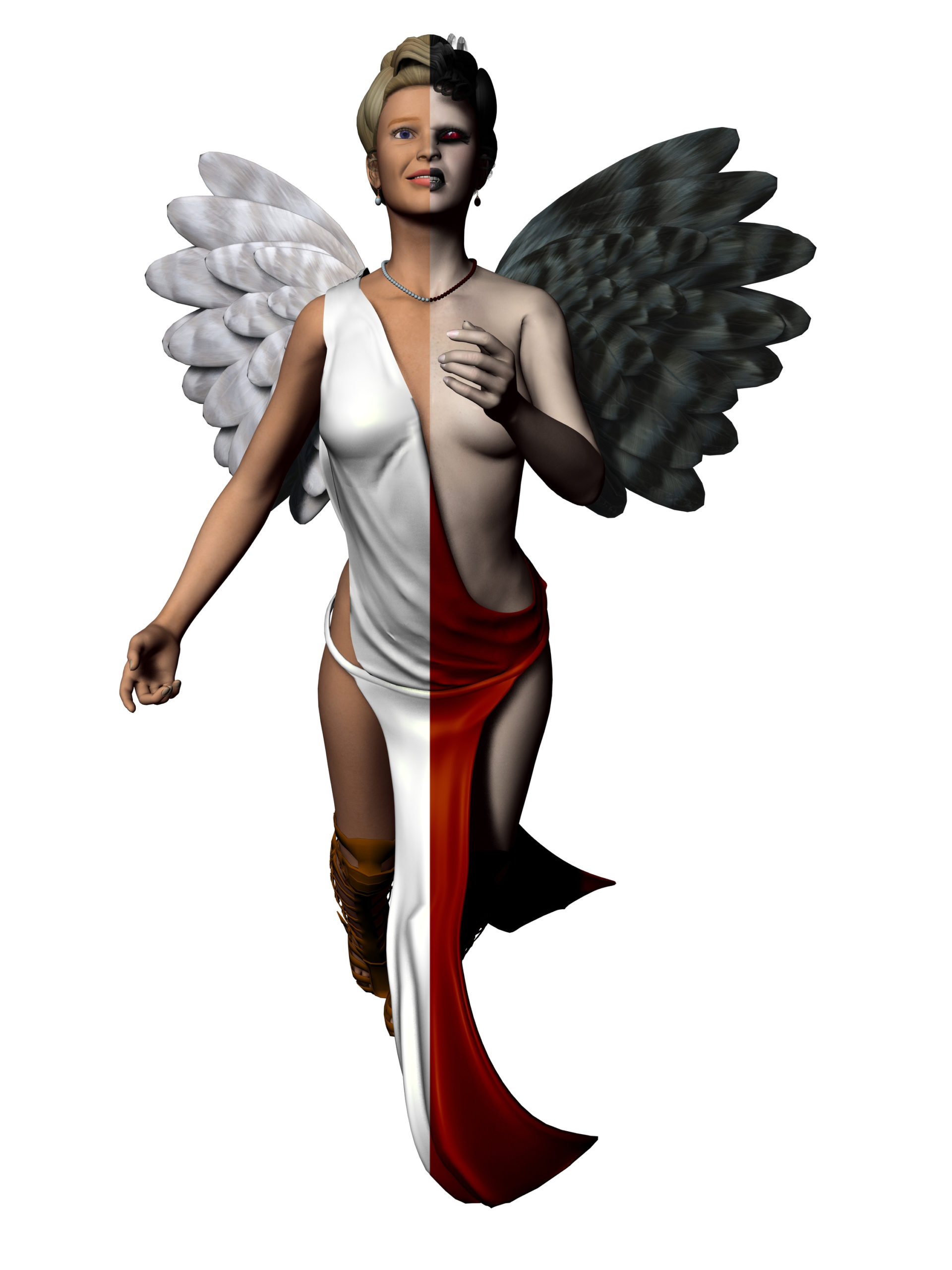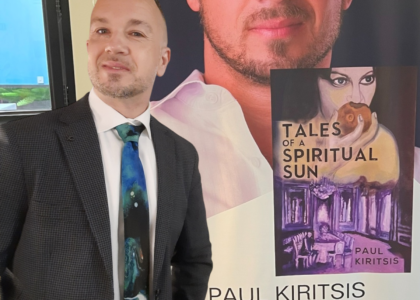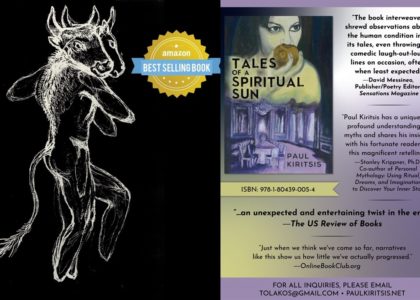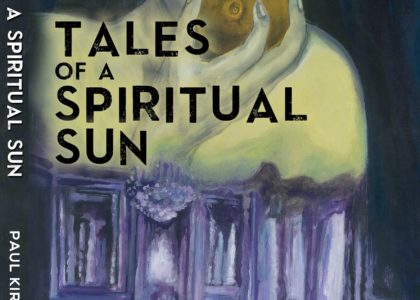
As we have thus far discerned, myths are humankind’s earliest attempts to explain the phenomena of the universe. Most primordial cultures did this by unconsciously projecting their inner psychic terrain onto the suprapersonal powers that mediated their immediate surrounds and formative environment. The vital need to ascertain a sense of order in an often chaotic outer realm led to the creation of stories that personified the forces and assimilated them into a coherent knowledge system accessible to all adherents of a particular culture. Human beings relate best to one another and to the world at large when they use the archetypes of the collective unconscious as tools of perception and interpretation, and our ancient ancestors would have been no different. As inheritors of a faculty for reasoning, they would have wanted to make sense out of celestial, terrestrial and aquatic phenomena as well as to discern how this prevailing natural order had come to be.
The search for an origin prompted the creation of a particular sort of mythic narrative known as a cosmogony. This word is of Greek origin and literally means ‘the birth of order’. For primitive man the concept of ‘order’ would have no doubt revolved around the rotation of the heavens and the seasons, meteorology, and the socio-political mechanisms of the group or tribe that enables efficient functioning and facilitates a basic sense of normalcy and wellbeing. Order is essential because it ensures stability. Stability, on the other hand, is the foundation stone of longevity, indestructibility, and survival. Over and above their spiritual orientation towards an animistic worldview, early human beings were vastly preoccupied with subsisting in a greater cosmos that would have appeared as mysterious and dangerous as it was beautiful. But to subsist it was imperative that they understood the things around them, their inherent nature, and from where they had sprung. They didn’t know what had transpired before their arrival, so they had to make do with a version of events bequeathed to them by their imaginations, and specifically by the image-forming proficiencies of their myth-makers or mythographers.
Coincidentally, mythical narratives centred on the birth of the universe are ubiquitous across all worldly cultures. Whilst many cosmologists have attempted to explain this phenomenon in the context of cross-cultural interaction, an even likelier possibility is that the archetypal contents of the rational psyche are indigenous to the human condition. Hence any concrete manifestations that arise from unconscious irruptions like myths, fantasies, visions, and rituals will differ only in their individual mode of expression. Moreover, almost all creation myths begin by dropping their audience into a primeval origin, a cold and dark dimension without time, space, or created matter that is about to differentiate through supernatural means. Many cosmogonies, particularly those from ancient Egypt and Greece, define this space as a primordial ocean of chaos encompassing infinite potential. From this primeval slime comes the physical universe together with the vault of the heavens with the stars and planetary spheres, the earth together with its chthonic aspects, the elements, as well as paraphysical and physical creatures, animals, and human beings. More often than not, this all-defining moment is preceded by the spontaneous appearance of self-generating vortices that spew forth a deity or a series of deities. Perhaps the most widely recognized of these is the Biblical Genesis in which the dramatic account of worldly creation is heeded by an eternal being called Yahweh who hovers in rumination over the illimitable abyss of the primordial waters. Water here is a symbol for a rudimentary condition of amorphousness and action potential that is yet to participate in the formative endeavours that create time, space, height, depth, breadth, consciousness, intelligence, and spirit. We could equate this chaos with the alchemical prima materia , the basic substance of which everything in the cosmos is comprised of. Whatever the case, the infinite potential for dimensions and worlds evaporates and the primordial sludge condenses into the one we recognize as our own.
The oldest Hellenistic myth centred on the genesis of the cosmos and the gods themselves comes to us from Hesiod, a poet who thrived around 700bce near the slopes of Mt Helicon in Boeotia. It is appropriately titled the Theogonia, a Greek name which translates to ‘the birth of the gods’. Hesiod lived and wrote at a time when the supernatural undercurrent of mythic consciousness was still highly integrated with municipal life, and so the myth transmits an aural and written tradition in which though processes were fairly unrefined and details about creation both spiritual and nebulous. In the poem, for instance, the masculine and feminine polarities of consciousness personified as Gaia (Earth) and Ouranos (Sky) begin life as a single entity before the former gives birth to the latter. On one hand they are the natural elements that have come into being and will wage war against one another and on the other they are the autonomous psychic entitles of unconscious and conscious that aim to bring about the nobility of civilization. This concept is represented symbolically through the vehement overthrow of an older generation of deities by a newer one. Representing the first order, Gaia and Ouranos rule the cosmos for an indefinite period of time but are steadfast replaced by their children, Rhea and Kronos, who are significantly more refined. These two are later replaced by an even more sophisticated order of divine beings heeded by Zeus and Hera, the king and queen of the mighty Olympians. The struggle between generations and the eventual victory of the younger breed illuminates the evolutionary ascent of human beings on the cosmic ladder of creation and their subjugation of a disordered and often volatile phenomenal world through the imposition of reason and willpower. In subduing the Titans, Zeus and his Olympian followers distanced themselves from the barbaric, antiquated, wild, reckless and savage ways of their immediate predecessors and fulfilled an eternal law whereby rationality and order will always have the upper hand over the contingencies of irrational chaos.
As literary devices operating within a cultural context myths are exceedingly powerful. In fashioning them the earliest Hellenistic poets (i.e. Homer and Hesiod) were not only handing down fictitious tales whose primary aim was to amuse and entertain but also presenting innovative archetypal models by which reality might be measured. In providing logical explanations or hypotheses about the origin and nature of the world, the mythographers were unconsciously creating a system of nascent knowledge that would go on to influence the cultural and socio-political fabric of society. Hesiod’s Theogony gives us some of the first glimpses of characteristics and qualities that would eventually form the communal landscape of classical Greece and Hellenistic societies as a whole. Ouranos (Sky), for example, abhorred his own children so much that he incarcerated them in the cavernous depths of Gaia (Earth). The punishment for this wrongdoing was to be emasculated by his youngest and most dreadful son, the Titan Kronos. This violent overthrow of father by son was repeated again in the next generation. In this instance Kronos was prevented from cannibalizing his own son, the infant Zeus by a clever ruse concocted by his mother and grandmother, Rhea and Gaea, respectively. When Zeus finally came of age he waged war against his father’s kingdom and order and emerged victorious. To all intents and purposes, both cases of forceful overthrow had been readily predetermined.
The Theogony, then, is something like a racial prototype of what classical Greece would become. In scrutinizing the myth one can discern a pantheistic and animistic cosmogony with patriarchal and aesthetically masculine leanings. Prominent and implicit in the text is: the complicated power relations between male personages of father and son; the prevailing martial sentiment to conquer and subjugate; the repetition of behavioural patterns and attitudes learned from a guardian; a philosophical stance that accepts the notion of hiemarmene or fate as a primal mover of the heavens, the world, and the flowering events therein; and the eventual subjugation of falsehood and injustice by truth. It shouldn’t be at all hard to see how all these principles and their ensuing attitudes eventually became core components of Hellenistic, Roman, and later Byzantine culture. Having remained omnipresent in the evolution of Western thought and civilization, they offer up an original reflection of values, affiliations to family and society, and innermost being–perceptions that subsist and mediate collective consciousness today.
From Myth and Knowing: An Introduction to World Mythology by Scott Leonard and Michael McClure. Copyright 2004 by The McGraw-Hill Companies, Inc. pp. 63-67.
The Beginning (116-38)
The very first to exist was Chaos,
and then Gaia, whose expansive lap
is the ever-safe foundation of the immortal gods
who live on the snowy peak of Olympos;
and then dark Tartaros, deep in the earth with its expansive paths;
and then Eros, the most beautiful of the gods,
whose power loosens our bones–
who controls the thoughts and decisions
of every god and every man.
From Chaos came Erebos and black Night.
From Night came Air and Day,
whom she conceived and gave birth to
from her love with Erebos.
Then gave birth to someone her equal,
the starry sky Ouranos, so that he
would cover her whole
and be the ever-safe foundation of the blessed gods.
She gave birth to the high Mountains
where heavenly Nymphs enjoy life
in mountain valleys.
But without the pleasure of love
She bore Pontos, whose stormy waves
are a barren sea. But then she
slept with Ouranos and bore Ocean
with his deep currents; then Koios and Krios;
Hyperion and Iapetos; and Theia and Rhea;
and Themis and Mnemosyne; and Phoebe
with her crown of gold;
and lovely Tethys; and after these
the youngest, most dreadful of her children, Kronos,
whose plans are crafty
and who hated his powerful father.
Kronos overcomes his father Ouranos (154-97)
All the children that Gaia and Ouranos had
were dreadful and from the moment they were born
their father hated them.
So as soon as they were born
he hid them, not letting them see light,
deep down in Gaia, and Ouranos
enjoyed his evil. But huge Gaia,
confined and groaning from within,
thought of something cunning and evil:
Quickly making a king of grey steel,
she forged a great sickle and showed it
to her children. She spoke to them
to give them courage though her heart was sad:
“My children your father is wicked. But if you’re willing
to listen to me, we can get revenge
for this evil and outrageous thing your father’s done,
as he was the first to plan these shameful things.”
This is what she said, and her children were immensely scared.
Not one of them uttered a word, but great Kronos,
whose plans are crafty, stood up and spoke these words [mythoi]
to his dear mother:
“Mother, I promise I’ll finish this
Since I don’t give a damn about my father,
as he was the first to plan these shameful things.”
This is what he said, and huge Gaia’s heart
was very happy. So she hid him
by putting him in a bush.
And in his hands she put the sickle,
its blade like jagged teeth,
and told him the whole plan
with all its deceit.
Bringing on the night, great Ouranos came,
and eager for love, he caught gold of
Gaia on all sides
and she was stretched in every direction.
But from the bush his son stretched out
his left hand with his right,
holding the huge sickle, long and jagged,
quickly cut his own father’s penis off
and threw it back so that it went behind him:
it didn’t leave his hand without purpose
as Gaia received all the drops of blood that haemorrhaged,
and when a year had passed
she produced the powerful Furies
and the great Giants, shining in their armour,
long spears in their hands,
and the Nymphs who are called Melian
throughout the expanse of the earth
and the penis he’d first cut off with the steel sickle
he threw out into the wild sea from the mainland
and it drifted in the ocean for a long time.
But then from this immortal flesh
a white foam [aphros] grew all around
and from within a girl was born.
Both gods and men call her Aphrodite
as she was born in aphros…
Zeus Overcomes His Father Kronos (453-500)
Kronos subdued Rhea who gave birth
to famous children: Hestia, Demeter, and Hera
with her sandals of gold; and powerful Hades
who with his merciless heart lives under the ground;
and earth-pounding Poseidon Ennosigaios;
and Zeus with all his wise plans,
the father of both gods and men,
whose thunder shakes the expansive earth.
But great Kronos swallowed them down as each came out
of Rhea’s holy womb and fell on their knees.
He did this so that no other royal descendent of Ouranos would
have the right to his throne.
For he’d learned before from Gaia and starry Ouranos that,
even though he was strong, it was his destiny to be
overcome by his son through the intentions of great Zeus.
So Kronos kept careful watch and swallowed down
his children while Rhea felt a pain
she couldn’t forget. But when she was
to give birth to Zeus, father of both gods and men,
she asked her parents for a plan:
how she might give birth to her child
without Kronos knowing; and how one of the
Furies of her father might get revenge.
They listened to their daughter and agreed,
both of them, to explain just what was fated
for king Kronos and her son
with his powerful heart.
So they sent her to Lyktos
in the rich land of Crete when she
was just about to give birth to great Zeus,
the last of her children.
And there huge Gaia received him
on the broad shores of Crete
to nurse and raise him.
She brought him there to Lyktos first
under cover of night
and taking him in her hands she hid
him in a deep cave
in the depths of holy earth
on Mt. Aigaion with its thick woods.
She then wrapped a great stone
in baby’s clothes and gave this
to the great lord, the son of Ouranos,
the king of the former gods.
He took it in his hands,
and put it down into his gut,
cruel god, who didn’t see
that the stone was not his son;
that his son was still alive–not troubled,
unable to be defeated.;
that his son would overcome him
with his bare hands by brute force
and take revenge; that his own son
would be lord of the immortals.
And so Zeus’s strength grew and glistening arms
and legs grew quickly.
And when a year had passed, great Kronos,
whose plans are crafty, but whom Gaia’s
wiser plans deceived, spit up his children.
And first was the stone, the last he’d swallowed,
which Zeus set up on earth with its wide paths
at the sanctuary of Pytho in the valleys
beneath Mt. Parnassos:
he left it as a sign, a wonder to mortals.









